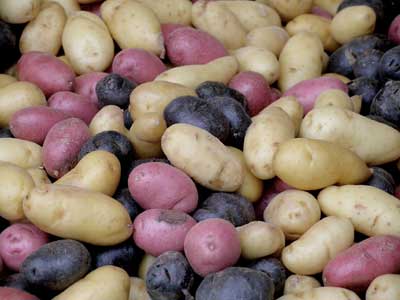Potatoes originated in South America, in Peru, from whence they have travelled around the world. Confronted with a potato it is difficult to tell whether it is a floury one or a waxy one. A way of testing this it take a bowl of brine (9½ cups water to 1 cup salt) and place a potato in it. If it sinks it is high in starch (floury) whereas if it floats, it will be waxy.
In the UK, most potatoes are lifted in October. Traditionally, children formed a major percentage of the workforce for this labour, so school half term holidays were designed with this in mind.
The potato was probably first domesticated in Peru or Chile over 4,000 years ago, but is a recent arrival to European shores, postdating the virtual destruction of the Inca empire by Pizarro.The Spanish started to bring potatoes back to Spain and ships which were taken by Drake and Raleigh are thought to have first brought the potato to England. It is now the fourth biggest crop in the world, after only rice, wheat and maize. Unexpectedly, more potatoes are grown in China than anywhere else. Paul Vallely, in an interesting article on potatoes in The Indepent, reports the suspicion in which this new food was held. In France it was said that they caused leprosy; in Scotland, devout Presbyterians abhorred them as they were not mentioned in the Bible; Russian peasants called them 'the devil's apples' and in some American colonies they were thought to be the spoor of witches. However, there were two main reasons for the success of the potato when it migrated to Europe. One was that it was a much more efficient producer of carbohydrate than grain, which had been the traditional food. It was also more safe from invaders. Slash and burn did not work quite so well with potatoes as with wheat fields and the like. In some places this resulted in a too great dependence on potatoes, and Ireland suffered appallingly when blight attacked the potato crop and caused a terrible famine.
Potatoes need steady rain and sunshine during the growing period, and global warming is have a noticeable affect on crops in England. Blight remains a problem with humidity is high. Mature potatoes, best stored unwashed and still covered with the soil in which they grow, can be kept for as long as six months in a cool, dark, humid place. Exposure to light turns them green. An average sized potato is around 100 calories.
